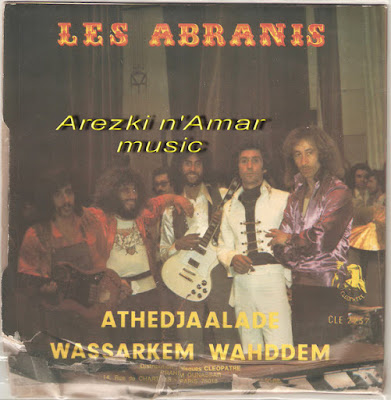Called "Oued Saïd Story," it was broadcast on April 3, 1999, and features clips of Scopitones that were made to show in the bars and cafés patronized by working-class Maghrebi immigrants in France. (It appears to be a shortened version of a film made by Michèle Collery and Anaïs Prosaic, called Trésors des scopitones arabes, kabyles, berbères.)
Scopitone was a kind of film jukebox, and some 280 films of Arab and Kabyle songs were produced for scopitones between 1965 and 1980 (Here is a list of titles, probably not complete).
The music films' subject, when the singer was North African and especially if they were based in France, was often the travails of life in exile, the rough work, troubles with European women, alcohol and the police, and nostalgia for the homeland. Scopitones featuring Salah Sadaoui were particularly amusing and bitter-sweet send-ups of the exile condition. (I've blogged about Sadaoui's scopitone "Nezouedj Ouahdi" here.)
Here's the list of clips you see bits of in this show:
There are a total four from Salah Sadaoui, an Algerian Kabyle singer who moved to France in 1954 and whose career was based there: "Letm’na Mraâa" (seen in its entirety here), "Ana Achki Fe Zine," "Hazmali Serouali," and"Sloulardji." (One of the last three is another name for what I've called "Nezouedj Wahdi" above.) If you're interested in seeing Sadaoui perform more traditional material, check out this YouTube vid.
Two from Tunisian folkloric singer Mohamed Jerrari, "Zerdet Couscous," and "Sayad El Out."
The famous Algerian singer Noura teams up with her husband Kemal Hamadi to do "Rabbi Adh Yessahel." On her own, Noura performs a Kabyle song, "Idourar." This Scopitone you can view in its entirety on YouTube.
There are two as well from the great Mohamed Mazouni, "Ould El Ghourba" and "Cherie Madame" (with Meriem Abed), both no doubt recorded during the years he spent in France (1973-82).
Slimane Azem, a Kabyle singer who moved to France in 1962, contributes "A Madame Encore à Boire."
Another great Algerian singer of the diaspora or ghorba, Dahmane El Harrachi, contributes "Ghir El Brah Ouana Farhan."
The famous Kabyle singer Idir does "Zwit Rwits" and, from 1975, "Azwaw":
The Algerian Kabyle rock band Les Abranis does "Athedjallade."
The Casablanca, Morocco rock band Golden Hands do "What to Say" (1968). Below is a minute of that Scopitone, very fuzzy.
Moroccan soul man Vigon, who I've blogged about previously, does "Harlem Shuffle":
My favorite Egyptian bellydancer Samia Gamal and Abdelsalam Nabulsi (uncredited) show up in one of the Scopitones.
Abdel Halim Hafez sings "Ya Khali El Qalb" with Nadia Lotfi in a scene from his film Abi Fawq al-Shagara. Below is a not very good clip.
There is a very brief clip of Abdel Halim's "Zay El Hawa," with Mervat Hatem, from the film Gana El Hawa.
Algerian singer Rabah Driassa does "Ouled El Djzair" and "El Houta."
Kabile singer Rachid Mesbahi does "Yarabi/Savon."
Moroccan artist Abdelwahab Doukkali gives us "Lahla Izid Ktire."
The Tunisian artist Hamadi Laghbabi performs "Sidi Mansour."
Taroub, a female Lebanese singer of Jordanian Circassian origin, does "Ya Hallak." Below is not the Scopitone, probably a clip from Lebanese TV.
The great Farid El Atrache does "Ya Gamil Ya Gamil."
Finally the great Sabah, with "Danse Orientale" and the divine "Allo Beirut," with lots of scenes of Beirut, Lebanon, for the nostalgist.
For more on the Arab and Kabyle scopitones see this article and this one.





No comments:
Post a Comment